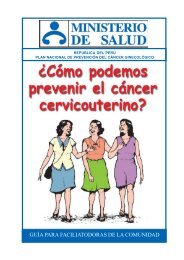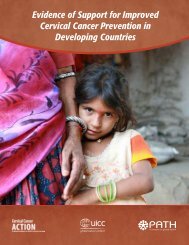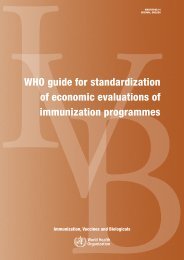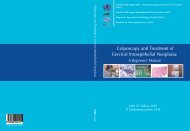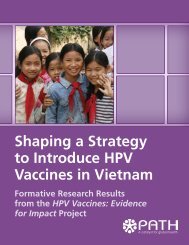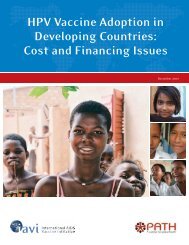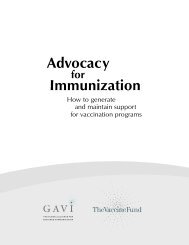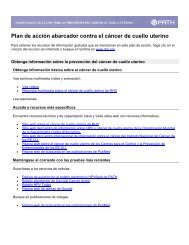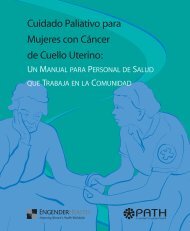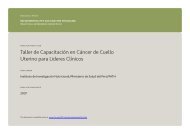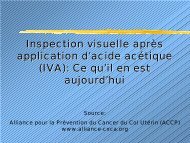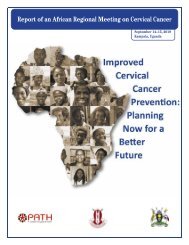Refresher Training for Frontline Health Workers in Expanded ... - RHO
Refresher Training for Frontline Health Workers in Expanded ... - RHO
Refresher Training for Frontline Health Workers in Expanded ... - RHO
You also want an ePaper? Increase the reach of your titles
YUMPU automatically turns print PDFs into web optimized ePapers that Google loves.
Process:<br />
Step 1: 5 m<strong>in</strong>utes<br />
Introduce the session to participants and expla<strong>in</strong> the learn<strong>in</strong>g objectives from the<br />
flipchart (#1 <strong>in</strong><strong>for</strong>mative found <strong>in</strong> Page 54 of this guide).<br />
Step 2: 10 m<strong>in</strong>utes<br />
Bra<strong>in</strong>storm with participants on the k<strong>in</strong>ds of th<strong>in</strong>gs they have been do<strong>in</strong>g to <strong>in</strong>crease<br />
caretakers and communities’ awareness and <strong>in</strong>volvement <strong>in</strong> immunization activities.<br />
Ask what they know about HEP and CHPI.<br />
Step 3: 25 m<strong>in</strong>utes<br />
Request that participants divide <strong>in</strong>to three groups. Give the situation cards (#1 <strong>in</strong><br />
Page 55 of this Facilitators guide) to each group. Each card describes a scenario of<br />
a mother and her child. Ask participants to read the card as a group and put<br />
themselves <strong>in</strong> the place of the mothers.<br />
Ask each person <strong>in</strong> the group to th<strong>in</strong>k about how they would feel if they were that<br />
mother and to discuss as a group. Ask them what fears they might have <strong>for</strong> their<br />
child, what they th<strong>in</strong>k about immunizations (if they know about them), what reasons<br />
could make mothers believe so and what they would do to change their situation?<br />
(10 m<strong>in</strong>utes)<br />
Ask a reporter from each group to briefly present the discussion (15 m<strong>in</strong>utes). Each<br />
reporter beg<strong>in</strong>s by read<strong>in</strong>g out to the plenary the situation card they were given. After<br />
all groups have reported, ask all participants: “What is the importance of<br />
discover<strong>in</strong>g how mothers th<strong>in</strong>k and feel about immunizations?”<br />
Step 4: 25 m<strong>in</strong>utes<br />
Facilitators select participants to rehearse a role play (#1 and #2 <strong>in</strong> this Facilitators<br />
guide Page 56 and 57). Pre-selected participants conduct the role play.<br />
Ask: “How do you th<strong>in</strong>k the mother felt <strong>in</strong> the role play?” “What did you th<strong>in</strong>k about<br />
how the health worker communicated to the mother?” “What did you th<strong>in</strong>k about<br />
what <strong>in</strong><strong>for</strong>mation the health worker gave the mother?” “Was it helpful?” “How would<br />
you do th<strong>in</strong>gs differently?”<br />
Conduct role play 2, and hold brief discussion.<br />
Show flipchart with effective communication techniques (#2 Page 58 <strong>in</strong> this<br />
facilitators guide).<br />
Step 5: 30 m<strong>in</strong>utes<br />
Ask participants to break <strong>in</strong>to groups of three with their neighbors. Ask each group<br />
to discuss and write 3 key messages on a card that a mother needs to know to better<br />
understand immunizations and address any concerns she may have. (5 m<strong>in</strong>utes)<br />
Collect and paste cards on the board and hold a discussion <strong>in</strong> plenary. (15 m<strong>in</strong>utes).<br />
Then Show participants the pre-prepared flipcharts (#3 Page 58 of this facilitators<br />
guide) list<strong>in</strong>g the 6 key messages a health worker can communicate.<br />
52



